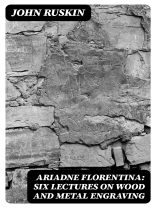In ‘Ariadne Florentina: Six Lectures on Wood and Metal Engraving, ‘ John Ruskin offers an intricate exploration of the craftsmanship and artistry inherent in the disciplines of wood and metal engraving. Combining theoretical insights with practical observations, Ruskin employs a richly descriptive literary style that reflects his deep reverence for beauty and moral purpose in art. The lectures serve not only as a technical guide but also as a philosophical treatise that situates engraving within the broader context of societal values and the preservation of artistic integrity during the Victorian era. John Ruskin (1819-1900), a towering figure of the Romantic movement, was both an art critic and social thinker, whose extensive writings sought to reconcile art with moral responsibility. His background in art history and his close ties to the Pre-Raphaelite Brotherhood inspired a lifetime dedication to advocating for artistic quality and the roles of the artisan. Through his lived experiences and scholarly pursuits, Ruskin presents engravings as not merely technical reproductions but as manifestations of human creativity and integrity. ‘Ariadne Florentina’ is highly recommended for artists, historians, and anyone interested in the deeper implications of craftsmanship. Ruskin’s reflections foster a renewed appreciation for the artistic process and its impact on society, making this work an essential read for those who wish to understand the enduring relationship between art, technology, and moral philosophy.
Sobre o autor
John Ruskin (1819–1900) was a pivotal figure of the Victorian era, renowned for his contribution to art criticism, social theory, and aesthetics. Ruskin’s legacy encompasses a prolific body of work that extends well beyond his remarkable expertise in art. He was also a poet, an environmentalist, a social thinker, and an educator whose ideas influenced the philosophy of the Arts and Crafts Movement and the founding of the National Trust and the Society for the Protection of Ancient Buildings. In his seminal work ‘Ariadne Florentina: Six Lectures on Wood and Metal Engraving’, Ruskin examines the art of engraving, offering his insights into the practice and philosophy that informs this creative process. These lectures underscore Ruskin’s belief in the spiritual and moral significance of art, a recurrent theme throughout his scholarly career. Ruskin’s prose is characterized by its richly descriptive language and its ethical underpinning, echoing his conviction that artistic expression must be morally conscious and spiritually uplifting. His influence on aesthetic theory and ethical art consumption remains substantial, reflecting his stature as a leading thinker of his time and a revered author in the pantheon of English literature.












